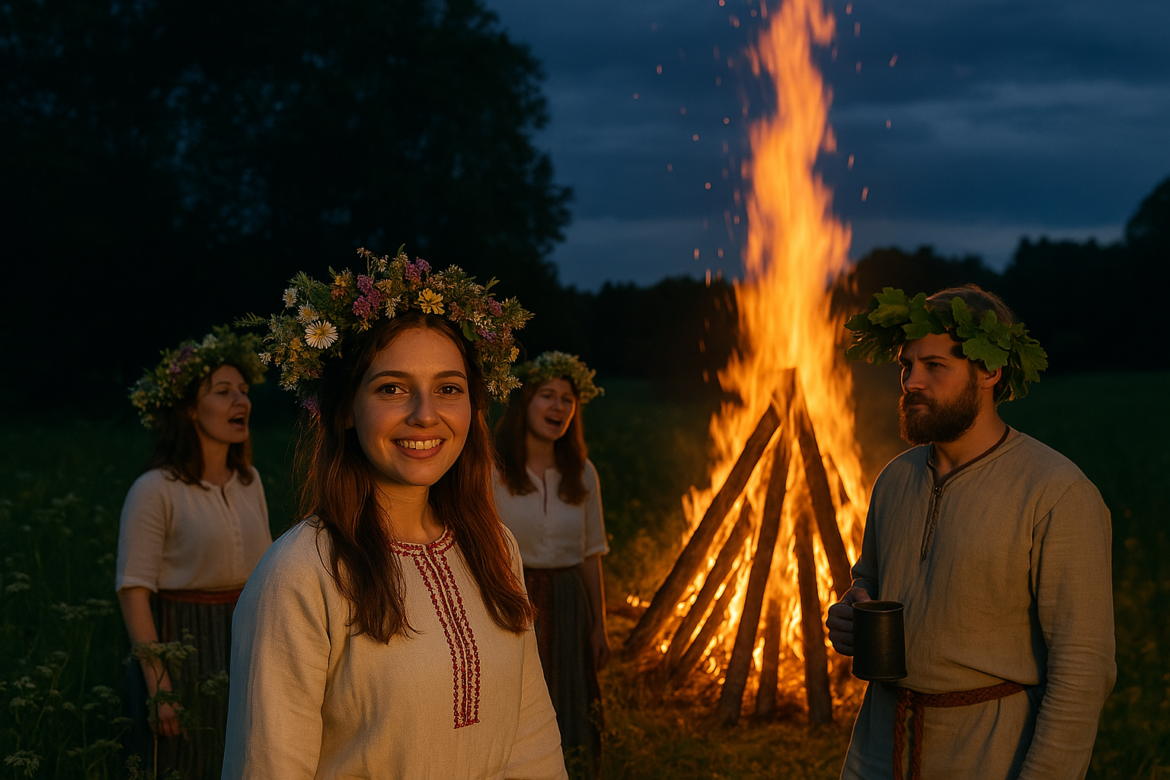The Latvian summer solstice traditions reach deep into the nation’s rich folklore and pagan roots. Every year, people gather to celebrate Jāņi, the magical shortest night of the year. It’s more than a party—this celebration connects Latvians with nature, ancestors, and each other. Traditionally held on June 23rd and 24th, Jāņi marks the peak of summer’s power and sunlight. Across Latvia, you’ll see bonfires burning and voices rising in joyful midsummer songs.
Preparing for Jāņi: Cleaning, Decorating, and Flower Picking
Before Jāņi begins, families clean their homes and prepare for the big celebration ahead. They also decorate their homes and yards with oak leaves, birch branches, and fresh wildflowers from nearby meadows. Women and girls pick flowers to craft wreaths, while men gather branches for oak crowns. Everyone contributes to transforming the home into a space filled with natural beauty and tradition. By sunset, everything glows with green garlands and blooming Jāņi decorations.
The Sacred Wreaths: A Symbol of Jāņi Magic
Jāņi wreaths play a powerful role in Latvian summer solstice traditions and hold symbolic meanings. Each flower carries significance, such as:
-
Fern for luck and mystery
-
Daisy for love and innocence
-
Cornflower for purity and clarity
Women carefully weave floral wreaths while singing songs passed down through generations. Meanwhile, men wear oak leaf crowns, symbolizing strength and bravery drawn from nature. After Jāņi, many toss their wreaths into rivers, hoping for blessings and protection.
Lighting Bonfires: A Central Part of Jāņi Celebration
As night falls, bonfires blaze across Latvia, becoming the heart of every Jāņi gathering. The fire represents the sun’s strength and protects against evil spirits roaming during the solstice. People sing, dance, and share food and drink while warming themselves near the fire. Many leap over the flames to cleanse their souls and bring good fortune. The bonfire burns all night, lighting up fields and forests across the country.
Singing Līgo Songs: Keeping Ancient Folklore Alive
Singing plays a key role in preserving Latvian summer solstice traditions, especially through beloved Līgo songs. The word “Līgo” means “sway,” but also carries blessings and joyful spirit. These traditional songs celebrate nature, love, harvests, and mythical beings of Latvian folklore. Families and friends join in, singing until dawn under the clear midsummer sky. These songs bind people together and keep cultural memory alive.
Dancing in the Fields: Celebrating Life and Energy
Dancing is another essential part of the Jāņi celebration and reflects the joy of the summer solstice. People gather in fields, form circles, and move rhythmically to the sound of traditional music. Each dance step honors the earth, the sun, and life itself. Children, adults, and elders all take part, smiling and laughing in celebration. These dances energize the body and connect everyone with ancient Latvian customs.
Traditional Foods and Drinks: A Jāņi Feast
Food plays a big role in Latvian summer solstice traditions, and families prepare a special feast. Jāņu siers, a caraway seed cheese, is a must-have at every Jāņi table. Grilled meats, fresh rye bread, and homemade beer complete the festive spread. Everyone gathers to eat under the open sky while the bonfire crackles nearby. Meals shared during Jāņi nourish both the body and the spirit.
Searching for the Fern Flower: A Mystical Midsummer Quest
One magical tradition of Jāņi involves searching for the legendary fern flower deep in the forest. According to folklore, the fern flower blooms only during the summer solstice night. Young couples often go on this quest together, hoping for love and happiness. Though ferns don’t really bloom, the search symbolizes mystery, romance, and discovery. It’s a cherished part of Latvian summer solstice traditions.
Greeting the Rising Sun: Ending the Night with Hope
After a night of singing, dancing, and joy, many people stay awake to greet the sunrise. Watching the sun rise symbolizes renewal, strength, and hope for the year ahead. Some sing quiet songs, others reflect on life while sipping tea or beer. The first rays of light are believed to bring health and happiness. So, the Jāņi celebration ends with warmth in hearts and golden skies.
Despite technology and modern life, Latvians keep their summer solstice traditions alive with pride. Jāņi brings people closer—to the earth, to each other, and to their national identity. It strengthens community, inspires joy, and honors deep cultural heritage. In cities and villages alike, Latvians light fires and sing under the stars. Every year, they celebrate Jāņi with the same passion as centuries ago.

